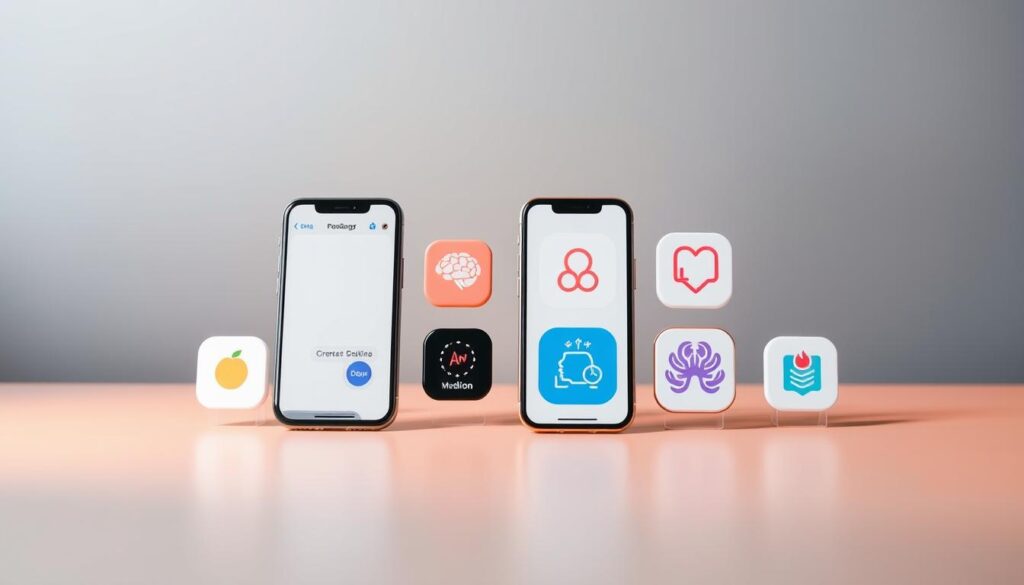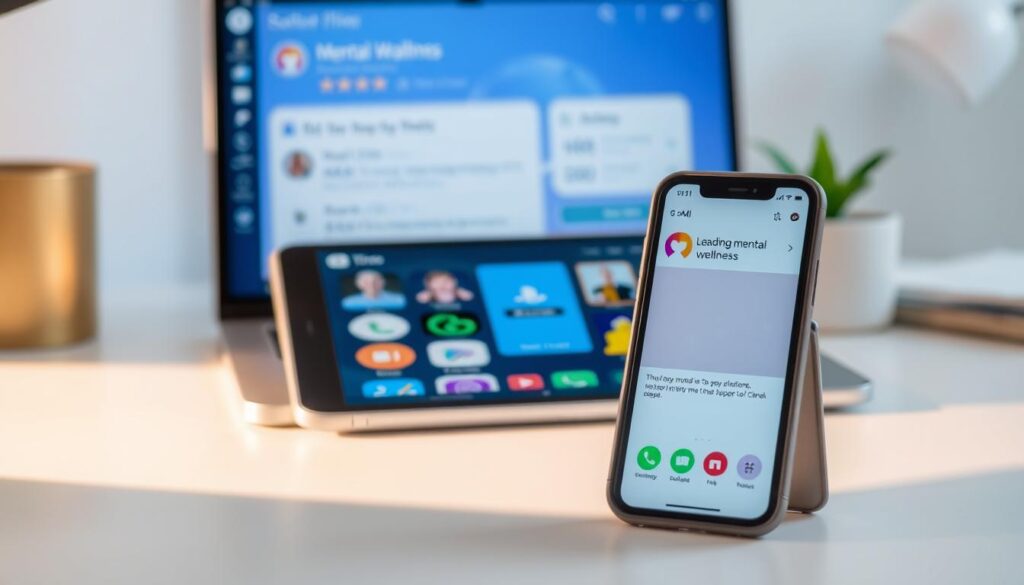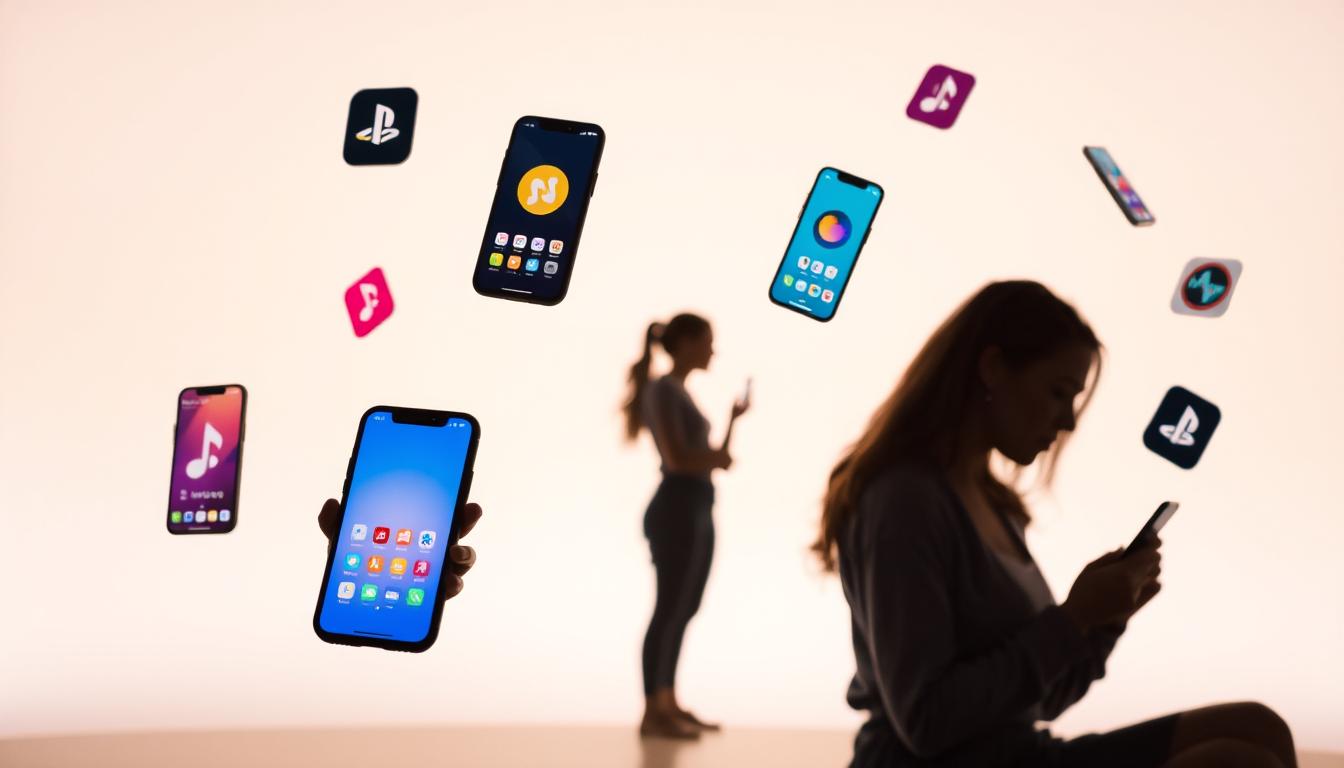In today’s fast-paced world, maintaining good mental health is more important than ever. With the rise of digital technology, mental health apps have become a popular tool for managing stress, anxiety, and overall well-being.
These apps offer a convenient and accessible way to monitor and improve your mental health from the comfort of your own home. Whether you’re looking for meditation guides, mood tracking, or cognitive behavioral therapy, there’s a wide range of options available.
As we explore the world of mental health apps, it’s essential to identify the top-rated and most effective options. This guide will walk you through the best mental health apps available, helping you make an informed decision about your mental wellness.
Key Takeaways
- Discover the most effective mental health apps for stress and anxiety management.
- Learn how to choose the best app for your specific mental health needs.
- Explore the features and benefits of top-rated mental health apps.
- Understand how mental health apps can improve your overall well-being.
- Get started with the most popular and highly-recommended mental health apps.
Understanding the Value of Mental Health Apps
Mental health apps are increasingly recognized for their potential to provide accessible and effective mental health support. These digital tools offer a range of benefits, from convenience and anonymity to personalized therapy and community support.
The Rising Importance of Digital Mental Health Support
The importance of digital mental health support cannot be overstated. With the rise of mental health awareness, more individuals are seeking help, and digital platforms are stepping in to fill the gap. Mental health apps provide immediate support, resources, and coping strategies, making them a valuable addition to traditional mental health care.

How Mental Health Apps Complement Traditional Therapy
Mental health apps complement traditional therapy by offering continuous support outside of therapy sessions. They provide tools for tracking mental health, managing stress, and practicing mindfulness. For instance, apps that offer guided meditation and mood tracking can help individuals monitor their progress and stay engaged in their mental health journey.
| Feature | Traditional Therapy | Mental Health Apps |
|---|---|---|
| Accessibility | Limited by appointment times | Available 24/7 |
| Personalization | Tailored to individual needs | Offers personalized content and tracking |
| Cost | Can be expensive | Often more affordable, with free options |
By comparing traditional therapy with mental health apps, it’s clear that both have their strengths. While traditional therapy provides personalized, human interaction, mental health apps offer convenience, accessibility, and a range of tools for mental health management. When choosing a mental health app, consider factors like mental health app reviews and mental health app comparison to find the one that best suits your needs.
The Best Mental Health Apps in 2023
With the rise of digital mental health support, 2023 has seen a significant surge in top-rated mental health apps. These apps offer a range of services from anxiety and depression support to premium therapy sessions, catering to diverse mental health needs.

Top Apps for Anxiety Management
Anxiety is a common mental health issue that can be effectively managed with the right tools and support. The following apps have been highly rated for their anxiety management features.
Calm – Features and User Experience
Calm is a popular app known for its guided meditation sessions and relaxing music. It offers a variety of features to help users reduce stress and anxiety, including sleep stories and breathing exercises. As noted by a Calm user, “The app has been a game-changer for my anxiety; it’s like having a personal therapist in my pocket.”
Headspace – Features and User Experience
Headspace is another highly acclaimed app that provides personalized meditation sessions. It offers customizable meditation plans and tracks user progress, making it easier to manage anxiety. A Headspace user praised the app, saying, “Headspace has helped me develop a consistent meditation practice, which has significantly reduced my anxiety.”
Leading Apps for Depression Support
Depression is a serious mental health condition that requires comprehensive support. The following apps are leading the way in providing depression support.
Woebot – Features and User Experience
Woebot is an innovative app that uses AI to provide mental health support. It offers mood-tracking features and cognitive-behavioral therapy (CBT) exercises tailored to the user’s needs. A Woebot user appreciated the app’s approach, stating, “Woebot’s daily check-ins have helped me stay on top of my mental health and feel more connected.”
MoodMission – Features and User Experience
MoodMission is an app designed to help users manage their emotions and improve their mental wellbeing. It provides personalized missions based on the user’s current mood and offers coping strategies for depression. As a MoodMission user noted, “The app’s missions have been incredibly helpful in managing my depression; it’s like having a supportive friend.”
Premium Therapy and Counseling Apps
For those seeking professional therapy, premium therapy and counseling apps offer a convenient and accessible solution.
BetterHelp – Features and User Experience
BetterHelp is a well-known platform that connects users with licensed therapists. It offers flexible scheduling and various communication methods, including text, voice, and video sessions. A BetterHelp user appreciated the platform’s flexibility, saying, “BetterHelp has made therapy more accessible and convenient for me; I can talk to my therapist from anywhere.”
Talkspace – Features and User Experience
Talkspace is another prominent therapy app that provides access to licensed therapists. It offers personalized therapy plans and allows users to message their therapists at any time. As a Talkspace user noted, “Talkspace has been a lifesaver; it’s comforting to know I can reach out to my therapist whenever I need support.”
Quality Free Mental Health Resources
Not everyone can afford premium mental health services. Fortunately, there are quality free mental health resources available.
Wysa – Features and User Experience
Wysa is a free app that offers a range of mental health tools, including mood-tracking and meditation exercises. It’s designed to be a supportive companion for users navigating mental health challenges. A Wysa user praised the app, saying, “Wysa has been a great resource for me; it’s friendly and non-judgmental.”
What’s Up – Features and User Experience
What’s Up is another free app that provides mental health support through CBT exercises and mood-tracking features. It’s a valuable resource for those looking for free mental health tools. As a What’s Up user noted, “The app has helped me understand my thoughts and feelings better; it’s a great tool for managing my mental health.”
How to Evaluate and Choose the Right Mental Health App
With the numerous mental health apps available, selecting the most suitable one requires careful consideration of several key factors. The process involves understanding your specific mental health needs, researching the app’s credibility, assessing its privacy policies, and considering the cost.
Step 1: Identify Your Specific Mental Health Needs
Before choosing a mental health app, it’s crucial to identify your specific needs. Are you looking for stress management techniques, anxiety support, or tools to help manage depression? Different apps specialize in various areas, so understanding your needs will help narrow down your options.
For instance, if you’re dealing with anxiety, you might look for apps that offer guided meditation or cognitive-behavioral therapy (CBT) techniques. Identifying your needs will make it easier to find an app that caters to those needs.
Step 2: Research App Credibility and Evidence Base
Once you’ve identified your needs, research the credibility of the mental health apps that cater to those needs. Look for apps that are backed by scientific evidence and have been reviewed or recommended by healthcare professionals.
Check if the app has been tested in clinical trials and if the results have been published in reputable journals. This information can usually be found on the app’s website or through a quick online search.

Step 3: Assess Privacy Policies and Data Security
It’s essential to assess the privacy policies and data security measures of any mental health app you’re considering. Ensure that the app complies with relevant health data protection regulations, such as HIPAA in the United States.
Review the app’s privacy policy to understand how your data is collected, stored, and used. Look for apps that offer robust security measures, such as encryption and secure login processes.
Step 4: Consider Cost and Subscription Models
Finally, consider the cost and subscription models of the mental health apps you’re evaluating. Some apps are free, while others require a subscription or a one-time purchase.
Evaluate the cost in relation to the features and services offered. Consider whether the app offers a free trial or a basic free version that can be upgraded to a premium service.
| App Features | Free Version | Premium Version |
|---|---|---|
| Guided Meditation | Basic Library | Full Library with Personalized Sessions |
| Mood Tracking | Basic Tracking | Advanced Analytics and Insights |
| Community Support | Limited Access | Full Access to Community Forums |
Step-by-Step Guide to Getting the Most from Mental Health Apps
To maximize the benefits of mental health apps, it’s essential to understand how to use them effectively. By following a few simple steps, you can enhance your mental wellbeing and get the most out of these digital tools.
Setting Up Your App and Creating a Profile
The first step is to set up your mental health app and create a profile. This typically involves providing some basic information, such as your name and email address, and setting a password. Be sure to choose a strong password to protect your data. Some apps may also ask for additional information, such as your mental health goals or current symptoms, to provide more personalized support.

Establishing a Consistent Usage Schedule
To get the most out of your mental health app, it’s crucial to establish a consistent usage schedule. Set aside a specific time each day to use the app, and try to stick to it. This could be during your morning routine, during your lunch break, or before bed – whatever works best for you.
Tracking Progress and Mental Health Improvements
Many mental health apps allow you to track your progress and monitor your mental health improvements over time. Take advantage of this feature to identify areas where you’re making progress and areas where you may need more support. This can help you stay motivated and focused on your mental health goals.
Combining App Use with Other Wellness Practices
While mental health apps can be incredibly beneficial, they’re most effective when used in conjunction with other wellness practices. Consider combining app use with activities like meditation, exercise, or journaling to enhance your overall mental wellbeing.
Knowing When to Seek Additional Professional Help
Finally, it’s essential to know when to seek additional professional help. If you’re experiencing severe mental health symptoms or if your symptoms persist or worsen over time, don’t hesitate to reach out to a mental health professional for support.
Conclusion: Embracing Digital Tools for Better Mental Wellbeing
As we’ve explored, top mental health apps offer a range of benefits, from anxiety management to depression support. By understanding the value of these digital tools and how to evaluate them through mental health app reviews, individuals can take a proactive approach to their mental wellbeing.
Embracing digital mental health support can be a game-changer. With the right app, individuals can access premium therapy and counseling services, track their progress, and combine app use with other wellness practices. By leveraging these resources, people can foster a more positive and proactive outlook towards mental health.
As you consider your own mental health journey, remember that digital tools are here to support you. By choosing the right top mental health apps and staying committed to your goals, you can unlock a more balanced and fulfilling life. Explore the options, read mental health app reviews, and start your path to better mental wellbeing today.
FAQ
What are the best mental health apps available?
Some of the top-rated mental health apps include Calm, Headspace, Woebot, MoodMission, BetterHelp, Talkspace, Wysa, and What’s Up. These apps offer a range of services, from anxiety and depression support to premium therapy and counseling.
How do I choose the right mental health app for my needs?
To choose the right mental health app, identify your specific needs, research the app’s credibility and evidence base, assess its privacy policies and data security, and consider its cost and subscription models.
Are mental health apps a replacement for traditional therapy?
Mental health apps are not a replacement for traditional therapy, but rather a complement to it. They can provide additional support and resources to help manage mental health.
What features should I look for in a mental health app?
When evaluating a mental health app, look for features such as mood tracking, cognitive-behavioral therapy (CBT) techniques, personalized coaching, and community support. Also, consider the app’s user experience, reviews, and ratings.
How do mental health apps ensure data privacy and security?
Reputable mental health apps ensure data privacy and security by implementing robust encryption, secure data storage, and strict access controls. They also comply with relevant regulations, such as HIPAA, to protect user data.
Can I use mental health apps for free?
Some mental health apps offer free versions or trials, while others require a subscription or one-time payment. Apps like Wysa and What’s Up offer quality free mental health resources.
How can I get the most out of a mental health app?
To get the most out of a mental health app, establish a consistent usage schedule, track your progress, and combine app use with other wellness practices. It’s also essential to know when to seek additional professional help.
